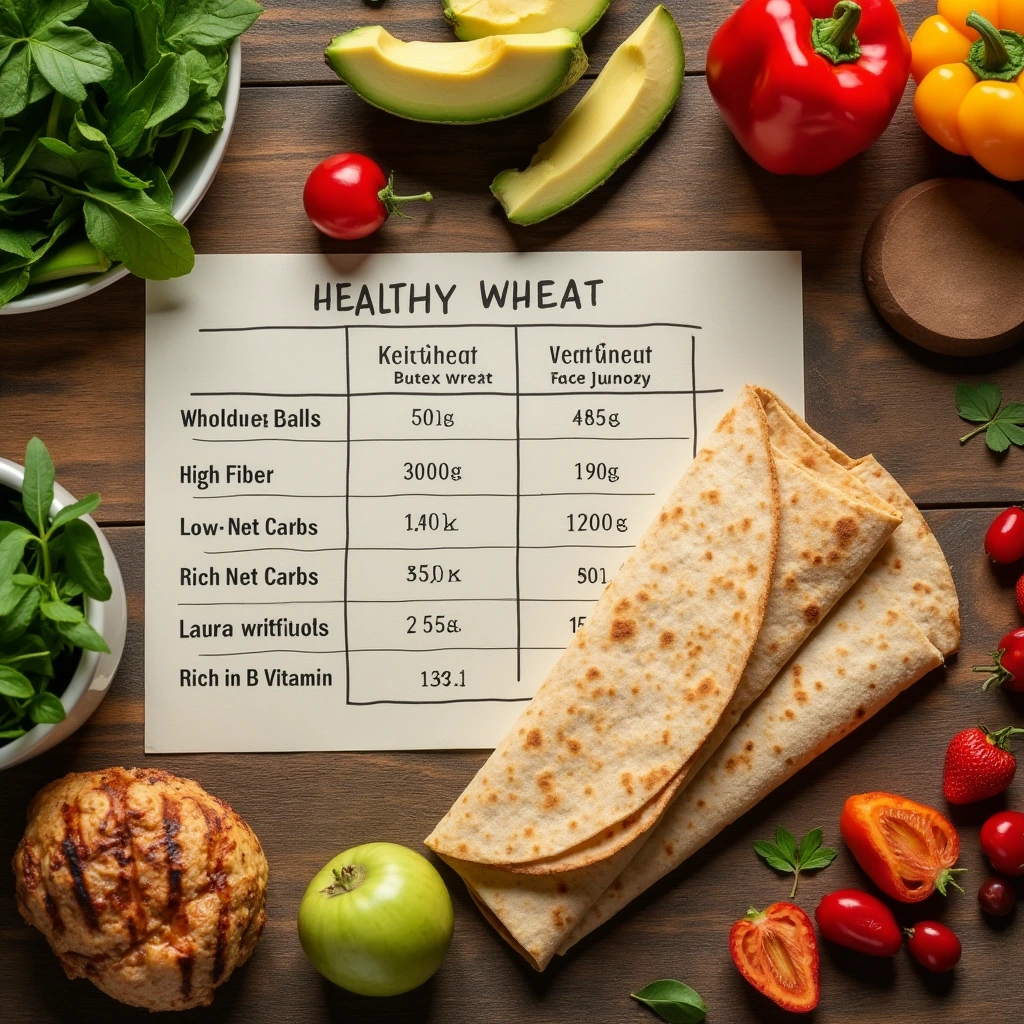Table of Contents
Ever stood at the grocery store, staring at the tortilla aisle, wondering how the carbs in a wrap affect your goals? With so many options—flour, corn, whole wheat, low-carb—it’s easy to feel overwhelmed. Your choice impacts not just taste but also your nutritional goals. Understanding the nutritional value of each type helps you pick the right one for your diet.
Key Takeaways
- Carb content in wraps varies widely depending on the tortilla type.
- Choosing the right tortilla can align with your health and dietary goals.
- Nutritional value includes more than just carbs—fiber, protein, and fats matter too.
- Healthy wrap options exist for keto, diabetic, or weight management diets.
- Reading labels and portion sizes helps you make informed decisions.
Understanding Carbs in a Wrap: The Basics
Choosing the right wrap starts with knowing the carbs in a wrap and their nutritional value. Every tortilla’s wrap carb content depends on its ingredients. Let’s break down what matters most.
What Makes Up the Carbohydrate Content in Wraps
- Flours: Wheat, corn, or almond flours set the base carb count.
- Starches: Additives like tapioca or potato starch boost texture but add carbs.
- Sweeteners: Sugars in flavored wraps increase total carbs.
These ingredients directly shape thewrap carb contentyou see on labels.
Why Carb Content Matters for Your Diet
Your goals drive what matters most. For weight loss, tracking carbs helps manage calorie intake. Athletes need quick energy from carbs, while those managing diabetes focus on steady blood sugar. Knowing thenutritional valueensures choices align with your health plan.
Different Types of Carbohydrates in Tortillas
- Refined carbs: White flour tortillas digest quickly, causing sugar spikes.
- Whole grain carbs: Oats or quinoa in wraps offer fiber and slower digestion.
- Resistant starches: Found in some plant-based wraps, these carbs act like fiber, aiding gut health.
Understanding these types helps pick wraps that fuel your body effectively.
Traditional Flour Tortillas: Carb Content and Nutrition Profile
Traditional flour tortillas are common in many kitchens. Their wrap carb content changes a lot, depending on size and ingredients. An 8-inch flour tortilla from brands like Mission or La Tortilla Factory has about 25–30 grams of carbs per serving. Bigger wraps, like 12-inch ones, can have almost double that amount. This makes it important to control how much you eat.
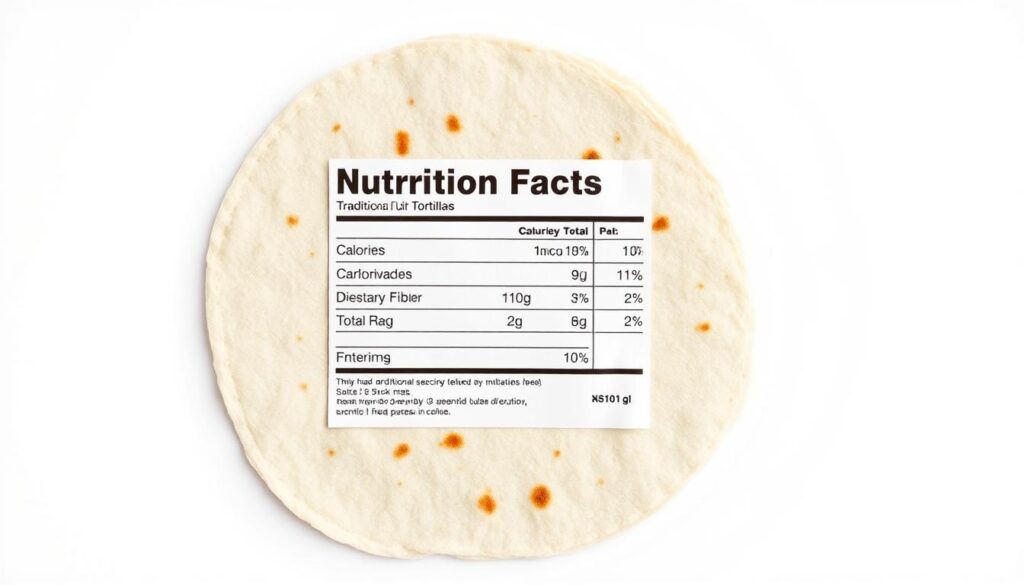
- Mission Soft & Flaky Flour Tortillas (8-inch): 26g carbs, 0.5g fiber
- Trader Joe’s Whole Wheat Flour Tortillas (9-inch): 28g carbs, 3g fiber
- Walmart Great Value Flour Tortillas (10-inch): 35g carbs, 1g fiber
These wraps are great for making burritos or tacos. But, they have a lot of carbs because they’re made from refined flour. Most have very little fiber (1–3g), which doesn’t help much. Also, they have a lot of sodium (200–300mg per tortilla) and not much protein (2–4g).
If you’re on a keto or low-carb diet, even the “light” options might be too high in carbs. Choose smaller sizes or whole-grain wraps to get more fiber and nutrients.
Corn Tortillas: A Lower-Carb Alternative?
Corn tortillas are a good choice for those watching their carb intake. They are lighter than flour tortillas, which are more common. Let’s look at how they compare and how to use them well.
Nutritional Comparison: Corn vs. Flour Tortillas
Corn tortillas have 15–20 grams of carb count in wraps. Flour tortillas have 25–35 grams. Corn tortillas also have a lower glycemic index, which means they release sugar slower. This helps control blood sugar.
Nixtamalization, a traditional corn process, makes them even better. It increases fiber and minerals like magnesium. Choose brands like Mission or La Milpa for quality.
- Corn: 18g carbs, 1g fiber, 50 calories (6-inch size)
- Flour: 28g carbs, 1g fiber, 120 calories (6-inch size)
Best Uses for Corn Tortillas in Your Meal Planning
Use corn tortillas when you want a crisp texture. Here are some ideas:
- Grill for tacos with lean proteins like grilled chicken or fish
- Bake into chips for veggie dips
- Wrap fish or veggies for a light lunch
Pair them with high-fiber fillings like black beans or avocado. This will help you feel full. For healthy wrap options, avoid heavy sauces to keep portions balanced.
Whole Wheat Wraps: Balancing Carbs and Fiber
Whole wheat wraps are a good choice for those looking for healthy wrap options. They keep more fiber and nutrients than refined wraps. Knowing their nutritional value starts with net carbs, which is important for diet planning.
Net Carbs: The Key to Smart Choices
Net carbs show how much sugar your body uses. For example, a 9-inch whole wheat wrap has 32g total carbs and 6g fiber. This means it has 26g net carbs. This helps you track carbs better, making whole wheat a better choice than white flour.
- Look for wraps with at least 4g fiber per serving.
- Compare wrap nutrition facts labels to spot added sugars or refined flours.
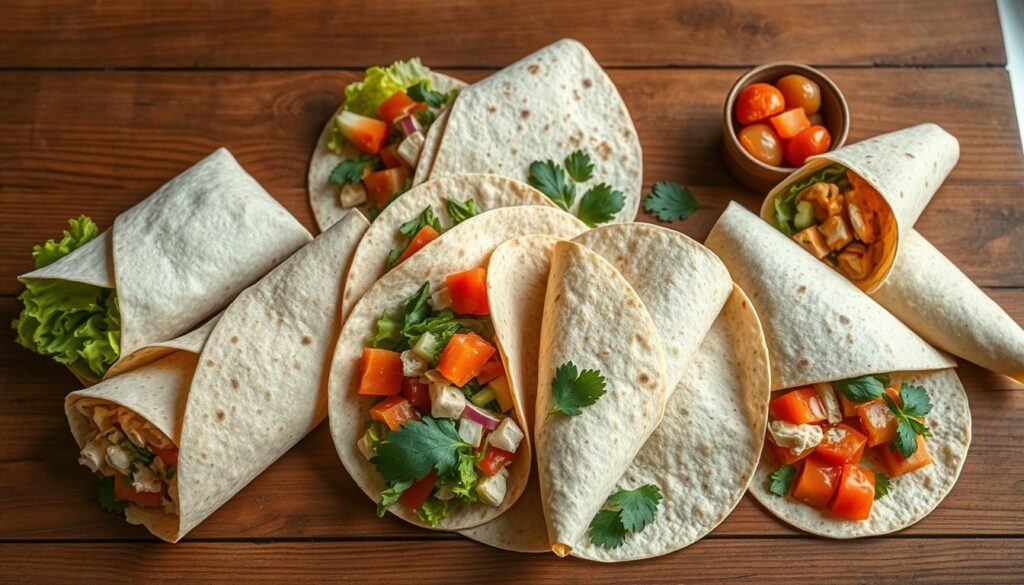
Health Benefits Beyond Fiber
Whole grain wraps also give you B vitamins, magnesium, and antioxidants. Brands like Ezekiel or Silver Hills have more fiber than others. Their slow digestion helps control blood sugar and keeps you full.
But, not all “whole wheat” products are the same. Stay away from those with enriched flour or malt syrup. Choose wraps that say “100% whole grain” first on the list.
Specialized Low-Carb Wraps: Options for Carb-Conscious Diets
Low carb wraps are great for those watching their carb intake. These carb-conscious wraps use special flours to cut down carbs. They still taste like regular tortillas. Ingredients like almond flour, coconut flour, and chickpea flour help reduce carbs and add fiber or protein.
- Almond flour wraps: Light and flexible, often under 5g net carbs per serving.
- Coconut flour blends: Add crispness with minimal carbs but may require toasting.
- Chickpea-based wraps: Higher in protein but check sodium levels in some brands.
Brands like Mission Carb Conscious Wraps and Anthony’s Almond Flour Wraps offer best low carb wraps. They have 2–6g net carbs each. When shopping, look for wraps with little added sugar or artificial stuff. Brands like Udi’s Low-Carb Tortillas focus on natural ingredients and keep the texture good.
Watch out for fillers like maltodextrin, which can increase carbs. Choose wraps with fiber-rich ingredients first. Try microwaving or pan-frying to make low carb wraps crisper.
Analyzing Wrap Macros: Beyond Just Carb Count
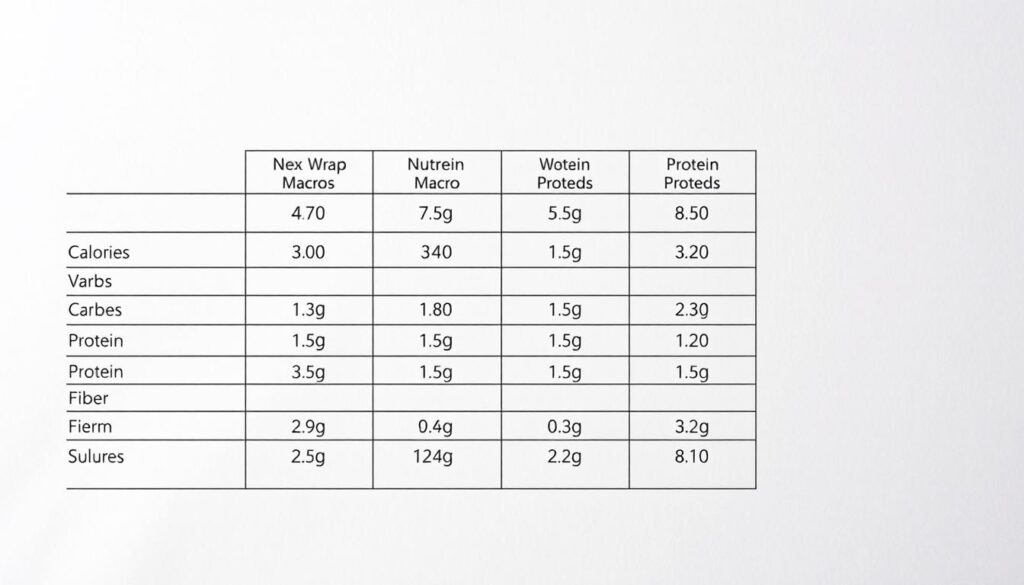
Choosing wraps isn’t just about carbs. Wrap macros—protein, fat, and fiber—are crucial for a satisfying meal. Let’s dive into these elements for better choices.
Protein Content in Different Wrap Options
- Traditional flour wraps have 3–5g protein. But, Ezekiel Sprouted Grain Tortillas offer 8g or more.
- Corn tortillas have 3–4g protein. Almond flour wraps have 6–7g.
- Protein keeps you full. Choose wraps with at least 5g to avoid energy drops.
Fat Profiles: Which Wraps Offer Healthier Fats?
- Look for wraps with unsaturated fats like avocado oil (in Mary’s Gone Crackers almond flour wraps) or flaxseed oils.
- Avoid wraps with trans fats or too much coconut oil.
- Check labels for heart-healthy fats.
Balancing Macronutrients for Optimal Nutrition
- Pair carbs with protein: A 10-inch whole wheat wrap (25g carbs) with chicken is more filling.
- Choose fiber-rich options: Wraps with ≥3g fiber slow down carb digestion.
- Watch total calories: High-protein wraps have 150–200 calories. Consider this in your daily calorie count.
A wrap with more carbs but high in protein and healthy fats might be better than a low-carb option. Always look at wrap nutrition facts as a whole.
Portion Size and Carb Count: How Size Affects Your Wrap’s Nutrition
Choosing the right size is key when tracking carb count in wraps. Bigger wraps have more wrap carb content. But, many forget how size affects nutrition. Let’s explore how to avoid this hidden calorie and carb trap.
Common Wrap Sizes in the Market
Brands like Mission and La Tortilla Factory offer a range of sizes. They go from small to jumbo. Here are the typical sizes:
- Small: 6–8 inches (tacos, taquitos)
- Medium: 8–10 inches (burritos, handheld wraps)
- Large: 12–14 inches (giant burritos, wraps for sharing)
Calculating Total Carbs Based on Tortilla Diameter
Carbs increase with size because of the surface area. A 6″ corn tortilla has 12g carbs. But, a 12″ flour wrap has 45g. Here’s the comparison:
| Size (inches) | Carbs (grams) | Best For |
|---|---|---|
| 6″ | 12g | Snacks, toppings |
| 8″ | 18g | Single servings |
| 10″ | 28g | Light meals |
| 12″ | 38g | Filling-heavy dishes |
| 14″ | 45g+ | Sharing portions |
Halving a 14″ wrap cuts carbs in half. It’s smart for tracking carbs in a wrap without losing flavor. Use this trick with ingredient swaps for balanced meals.
Reading Wrap Nutrition Facts: What to Look For
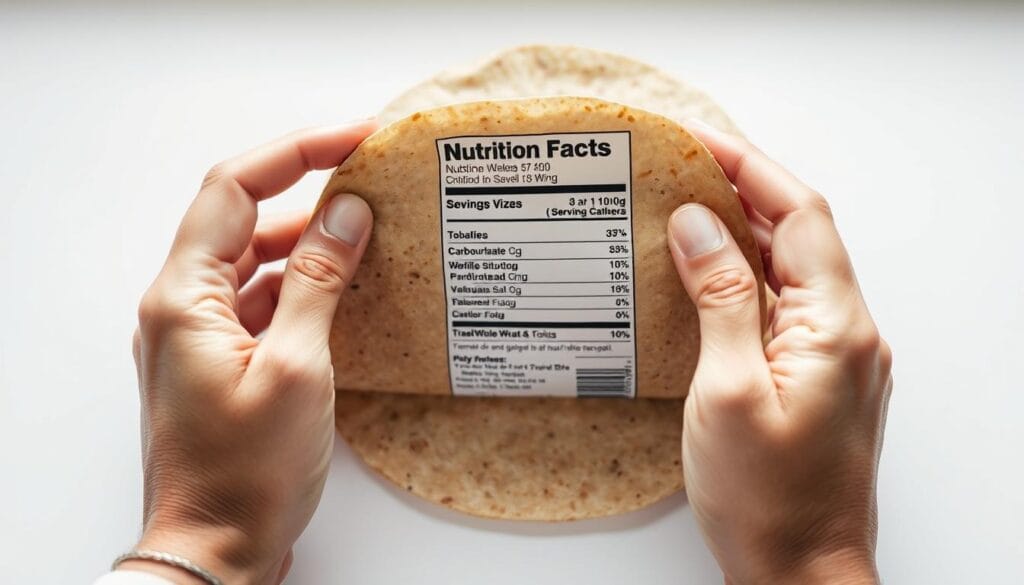
When picking carb-conscious wraps, first check the wrap nutrition facts label. Look at the wrap carb content per serving. Also, check the ingredients list for hidden sugars or additives. Here’s how to understand the numbers:
- Check the wrap carb content under “Total Carbohydrates.” Subtract fiber to find net carbs.
- Spot added sugars—ingredients like dextrose or maltodextrin increase carb counts.
- Verify fiber sources: Look for brands using inulin or psyllium husk for natural fiber.
Compare these wrap nutrition facts across brands using this guide:
| Wrap Type | Total Carbs (g) | Fiber (g) | Added Sugars |
|---|---|---|---|
| Claire’s Organic Corn | 22 | 2 | 0 |
| Weight Watchers Whole Wheat | 28 | 4 | 0 |
| Low-Carb Mission Flax | 9 | 6 | 0 |
Watch out for terms like “low carb” without solid proof. Some brands use sugar alcohols that still raise blood sugar. Always check the wrap nutrition facts panel. Choose wraps with 5g or fewer net carbs if you’re tracking closely.
Best Low Carb Wraps for Specific Diets
When picking wraps, your diet goals are key. Here’s how to find the best low carb wraps for you:
Keto-Friendly Wrap Options
- Joyfoodsun Almond Flour Wraps (3g net carbs/serving)
- Now Pea Protein Wraps (2g net carbs, soy-free)
- Flax Lining Coconut Flour Wraps (4g net carbs, gluten-free)
These wraps have less than 5g net carbs. Look for egg or almond-based ones at health stores.
Diabetic-Friendly Tortilla Choices
- Mission Carb Smart Corn Tortillas (8g net carbs, 3g fiber)
- Mary’s Gone Crackers Seed Flatbread (10g net carbs, high fiber)
Go for wraps with 4+ grams of fiber. These options help manage blood sugar and keep energy steady.
Wraps for Weight Management
- La Tortilla Factory Whole Grain (190 calories, 30g protein)
- Ezekiel Sprouted Whole Grain (140 calories, 7g fiber)
Choose wraps with fewer calories and more protein/fiber. Use 10-inch sizes to control calories.
Homemade Alternatives: Creating Lower-Carb Wraps in Your Kitchen
Take control of your diet by making your own low carb wraps. You can pick the ingredients to fit your needs. These recipes help you make wraps with less carbs but still tasty and flexible.
Simple Low-Carb Tortilla Recipes
Here are some easy recipes to start with:
- Almond Flour Wraps: Mix ½ cup almond flour, 1 egg, and 2 tbsp water. Cook on a skillet until firm. Each wrap has 2g net carbs and lasts 5 days in the fridge.
- Flaxseed-Psyllium Wraps: Mix ¼ cup flaxseed meal, 1 tbsp psyllium husk, and 3 tbsp water. Roll thin for flexibility. Yields 3g net carbs per wrap and freezes well.
Ingredient Substitutions for Reducing Carbs
Change recipes by using carb-conscious wraps ingredients. Key swaps:
- Replace 1 cup wheat flour with ½ almond flour + ½ psyllium husk.
- Coconut flour adds fiber but needs less liquid (start with 1 tbsp per ¼ cup flour).
Fix texture by adding 1–2 extra egg whites. Let dough rest 10 minutes before rolling. For flavor, sprinkle garlic powder or herbs without adding carbs. These tips turn your kitchen into a place for healthy wrap options.
Try these methods to make wraps that fit your goals. Adjust the ratios as you go and track the results for the best taste and texture.
Conclusion: Choosing the Right Wrap for Your Dietary Needs
Your perfect wrap depends on what you want to achieve. For those watching carbs, Mission corn tortillas or Siete’s grain-free wraps are great. If you’re looking for something a bit more, try La Tortilla Factory’s whole wheat or Anthony’s low-carb wraps.
Traditional flour wraps can also be part of a healthy diet when filled with veggies and protein. It’s all about balance.
When picking a wrap, look at the nutrition labels and how much you’re eating. Opt for wraps high in fiber or low in carbs to fit your diet. Making your own wraps lets you control the ingredients, using almond or coconut flour for example.
Remember, it’s not just about carbs. Think about the overall health benefits of what you’re eating. Even if you choose a wrap with more carbs sometimes, it can still be part of a healthy diet. The most important thing is to make choices that support your health goals and taste good.
FAQ
What is the average carb count in wraps?
The carbs in wraps can change a lot. Traditional flour tortillas have about 30-40 grams per wrap. Low-carb wraps might have only 4-10 grams. Always check the nutrition label for exact carb counts.
How can I determine the nutritional value of a wrap?
To find out the nutritional value, read the nutrition label. Look for total carbs, fiber, and net carbs. Net carbs are total carbs minus fiber. This helps you see if the wrap fits your diet.
Are there healthy wrap options for a low-carb diet?
Yes, there are many healthy wraps for a low-carb diet. You can find wraps made from cauliflower, almond flour, or other low-carb ingredients. Brands like Maria and Ricardo’s and Siete Foods offer great choices for a low-carb lifestyle.
What are the best low-carb wraps available in the market?
Some top low-carb wraps include Mission’s Carb Balance, La Banderita Low Carb Tortillas, and NuCo’s Coconut Wraps. These wraps are lower in carbs but still tasty and flexible for meal prep.
How do I calculate the carb count based on the size of my wrap?
To figure out carbs by wrap size, remember bigger wraps have more carbs. Use the wrap’s diameter to estimate carbs. A nutrition reference chart can help guide you.
What types of wraps are suitable for diabetic diets?
Diabetic-friendly wraps should be low in carbs but high in fiber. Look for wraps labeled as high fiber or made from whole grains. Wraps with almond or coconut flour are also good choices because they have a lower glycemic index.
How can I read wrap nutrition facts effectively?
To understand wrap nutrition facts, focus on serving size, total carbs, fiber, and added sugars. Be cautious of claims like “low carb” or “high fiber.” They might not always be true.

